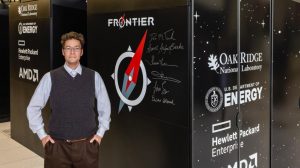April 16, 2024 — In 2023, liaisons from the Science Engagement section in the National Center for Computational Sciences at the Department of Energy’s Oak Ridge National Laboratory were recognized as part of the two teams who would go on to win the Association for Computing Machinery’s Gordon Bell Prize and the Gordon Bell Prize for Climate Modeling at the International Conference for High Performance Computing, Networking, Storage and Analysis, or SC23.

The annual Gordon Bell Prize recognizes outstanding achievement in high-performance computing. The Gordon Bell Prize for Climate Modeling debuted in 2023 to recognize significant contributions from climate scientists and software engineers to solving the climate crisis.
The successful collaboration with Science Engagement liaisons exemplifies the section’s mission to accelerate scientific discovery and ensure optimal computational results for users of the Oak Ridge Leadership Computing Facility, a DOE Office of Science user facility, by partnering them with domain and high-performance computing, or HPC, experts.
Liaisons have scientific expertise in areas such as particle physics, chemistry and materials, biology and engineering. As domain scientists, they can understand and guide research design and methodology. As computational experts, they can refactor code, hack algorithms, predict scaling challenges and troubleshoot issues to ensure projects perform as well as possible. Liaisons also connect users with other expertise, initiatives and resources within DOE’s research ecosystem.
“The expertise of our staff is invaluable for these projects. They are talented staff whose domain expertise and computational experience make a significant contribution to HPC and the scientific community,” said Tom Beck, the Science Engagement section head.

Performance engineer and computational scientist David Rogers worked with the international team that won the 2023 Gordon Bell Prize for “Large-Scale Materials Modeling at Quantum Accuracy: Ab Initio Simulations of Quasicrystals and Interacting Extended Defects in Metallic Alloys.” Using the HPE Cray EX exascale supercomputer Frontier and the IBM AC922 Summit supercomputer, the team modeled an alloy with near-quantum accuracy in one of the largest simulations of its kind.
As an expert in computational chemistry and HPC, Rogers worked with the team to prototype machine-specific optimizations, explore effective use of libraries and implement reproducible code compilation and execution.
“In the years leading up to this collaboration, I participated in the Center for Accelerated Application Readiness, which allowed me to collect ideas and best practices from everyone involved. I was able to use this experience for the Gordon Bell research and help the team effectively harness the power of Frontier,” Rogers said.
Rogers is enthusiastic about the impact of the team’s scientific breakthrough. The team’s simulation method, which combined an innovative finite-element based density functional theory technique with a scalable code, can be used to better understand nanoparticles, surfaces and intermolecular interactions that lie at the heart of materials and biochemistry.

Matt Norman, a computational climate scientist and group leader for the Advanced Computing for Life Sciences and Engineering group at ORNL, is a co-author on the paper that won the first Gordon Bell Prize for Climate Modeling, “The Simple Cloud-Resolving E3SM Atmosphere Model Running on the Frontier Exascale System.” Norman worked with fellow ORNL staff Sarat Sreepathi, computer scientist, and James “Trey” White, distinguished research scientist, to prepare and speed the climate runs on Frontier.
Norman has worked on the Energy Exascale Earth System Model, or E3SM, in various iterations, for over a decade. Original versions of the code consisted of millions of lines of code that were not optimized for GPUs. Norman performed most of the porting of the Rapid Radiative Transfer Model for GCMs in Parallel, a radiation code, to portable C++ in preparation for running on Frontier. RRTMGP is one of the most computationally expensive components of the full model, so successfully porting it for AMD GPUs was essential for a successful runtime.
“I’m excited to see a fully realized storm-resolving climate simulation win the Gordon Bell Prize,” Norman said. “The full model, with all the physics included in the runtime, ran at a speed that would allow us to simulate climate timelines in a realistic time frame.”
“I am thrilled to be part of the science effort that won the inaugural Gordon Bell Prize for Climate Modeling, first as a vendor collaborator and now as a liaison in Science Engagement. I love helping our users make the most of leadership computers,” White said.
For Beck, the two awards represent the capabilities, expertise and spirit within NCCS and the Science Engagement section.
“It is remarkable that we had key personnel who were intimately engaged with the research that won each prize. Chemicals and materials simulation and climate modeling are both crucial scientific areas that are addressing grand science challenges,” Beck said. “As a section, we want to foster a creative spirit for bringing in innovative projects like these and solving problems that can’t be solved anywhere else.”
UT-Battelle manages ORNL for the Department of Energy’s Office of Science, the single largest supporter of basic research in the physical sciences in the United States. The Office of Science is working to address some of the most pressing challenges of our time.
Source: ORNL

























































